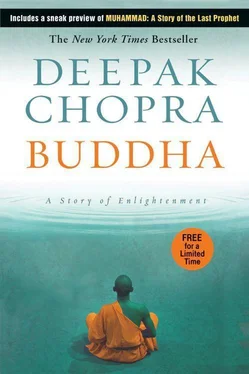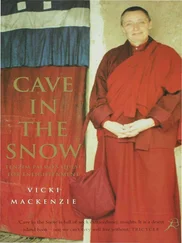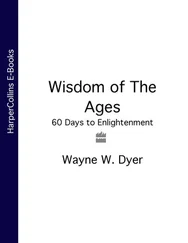Brushing the attackers off, and with them the blood from their bites, she said, “What are you doing to yourself? I didn’t pull you out of the woods so you’d care about nothing. Find something, and do it quick.” She turned away and began to cry.
“I’d obey you if I could,” said Gautama. “I owe you everything.”
His voice sounded humble and sincere, but inside he was as detached from her distress as from everything else. Sujata sensed this, no doubt. Otherwise how to explain the fact that he woke up the next day to find the hut empty? She left pots of food but nothing else. The door was locked, the floor still damp from being washed. Gautama took this all in and waited. He wondered, as an impartial spectator might wonder watching a stranger, if his mind would grieve or feel abandoned. When nothing happened, he went outside to watch the clouds, something he did every day.
Every day that he grew stronger, he felt more removed from that fiercely certain monk who had been willing to die for God. Gautama wasn’t a zealot anymore, but there was nothing to put in its place. He took his eyes off a camel-humped cloud and looked at his hands. They had fleshed out again, and so had his wasted arms and legs. He tried to remember how old he was. Thirty-five seemed right. Young enough to take up honest labor or return to the monk’s life, or even go home and become the good prince again.
It was time to choose one, since he couldn’t remain alone in Sujata’s hut. Choosing seemed impossible, though. He was a blank. At best he was a vaporous, drifting cloud, like the ones he stared at. After a while, Gautama decided to imitate a cloud by going nowhere in particular. He cleaned the hut of any sign that he had ever stayed there, shut the door behind him, and walked away.
When his sandals contacted the familiar packed dirt of the road, his gait settled into a mechanical tread. Soon he passed other travelers, but they didn’t look his way. Maybe he’d lost his presence too, or perhaps it was just his half-starved appearance. Gautama’s eyes saw the sights of the jungle-birds, animals, the light streaming in bright bars through the still leaf canopy-and he had the impression that every sensation was passing through him. I am water, he thought. I am air.
This wasn’t unpleasant. If he was going to spend the rest of his life as a blank, feeling transparent wasn’t the worst thing. He walked a bit farther, and he had another thought. I am not suffering. When had he stopped suffering? He didn’t know, because his body had been in pain for those weeks, which distracted him. Physical pain wasn’t the same as suffering, he realized that. Suffering happens to a person, and he was fairly sure he had turned into something new, a nonperson.
He stared at the sunset, its red-gold streaks breaking through tall white clouds. Over the jungle canopy he saw the crest of a tall tree and headed for it. The ground around the tree was soft and springy, free of fungus. He looked up and saw that this was a pipal or fig tree. The sky darkened quickly; soon it was barely possible to see sapphire patches between the black silhouettes of the foliage. Gautama sat down to meditate.
He wondered if a nonperson needed to meditate, and at first the answer seemed to be no. When he closed his eyes he didn’t sink into a cool, safe silence. Instead, it was like being in a lightless cave where there was no difference between having his eyes open or shut. But since he had nothing to do and nowhere to go, he decided that meditation was as good as anything else. He caught sight of the waning moon, which was three-quarters full. Vaguely Gautama thought it would be nice to be the moon. And then he was.
It didn’t happen immediately. He sat, and the waning moon turned into a sliver, then a hairline of luminescence in the sky, before it waxed again. He caught a glimpse of it only once a night; otherwise he had his eyes closed. Nothing was changing inside him. Only by the moon did Gautama realize when seven weeks had passed.
“I’m here. You can open your eyes now.”
Gautama was past having delusions, so the voice must be real. He opened his eyes. A yogi with long locks and a beard had found him and was sitting with crossed legs under the tree. The moonlight was bright enough to reveal the face of the doomed monk Ganaka.
“You don’t have to disguise yourself,” said Gautama. “I was expecting to see you, Mara.”
“Really?” The form of Ganaka smiled. “I didn’t want to shock you. I am, as you know, basically kind.”
“Kind enough to show me an image of grief? I am past grieving,” Gautama said.
“Then take this image as a greeting from Ganaka instead. I know him well,” said Mara. “He is in my care now.”
“Then he must be in a place of torment. But I am beyond horror too. So tell me quickly why you’ve come, with as few lies as you can.”
“I’m here to teach you. Remember, that was my offer when you were young,” Mara said. “But you misjudged me, as everyone does. Now you must be wiser.”
“You think it’s wiser to have a demon for a teacher?” As they bantered, Gautama felt nothing toward Mara, neither fear nor dislike. Even wondering why the demon had sought him was a faint impulse on the edge of his mind.
“You still misjudge me,” Mara said in a cajoling voice. “I know the secrets of the universe. No knowledge can be kept from me since my role is to see into the crevices of every soul. I will share all that I know with you.”
“No.”
“I didn’t hear that. You’ve craved knowledge ever since I met you. I saw it in your eyes. Why turn your back on me now? I’m greater than these yogis you’ve wasted your time with,” the demon said.
“The one who wanted to know everything no longer exists,” said Gautama. “I have nothing left to ask.”
“Stubbornness doesn’t become you, my friend. I’m disappointed.” Mara’s tone of voice was smooth and assured, but he was sitting close enough that Gautama felt the demon’s body tremble with suppressed rage. Mara said, “I thought you were above other souls. But if you insist on being common, let me satisfy what you really want.”
These words were greeted with peals of laughter. Through the trees came three beautiful women carrying oil lamps; incense swirled around them. As Gautama watched, a pool of water appeared in the forest. The women began to disrobe, casting glances at him and giggling softly.
“My three daughters,” said Mara. “They never fail to charm, so why pretend? You want them.”
The women had silky pale skin and full breasts. Gautama looked on while they bathed themselves, using every suggestive gesture they could find; their hands were delicate, and the way they touched themselves only faintly hinted at lewdness.
“I told them you weren’t coarse, but as you can see, they will adapt themselves to your every desire,” said Mara.
“Yes, I see that,” said Gautama. “The man who once had a wife no longer exists. I can accept your daughters as new wives. Tell them to approach.”
Mara smiled with satisfaction. The three women emerged from the bathing pool and draped themselves with gossamer saris that showed their naked bodies in the moonlight. Mara made a gesture, and the first daughter knelt submissively before Gautama.
“What is your name, beautiful one?” Gautama asked.
“I am Tanha.”
“Your name means ‘desire.’ I will take you for a wife, but unfortunately I have no desire for you. If you marry me, you will never feel desire or be desired ever again. Is that acceptable?”
Before his eyes the lovely face of Tanha turned into the face of a long-toothed demon, and with a howl she vanished from sight.
“Let me see your second daughter,” said Gautama. Mara, looking displeased, waved his hand abruptly, and the second young woman knelt before them.
Читать дальше












